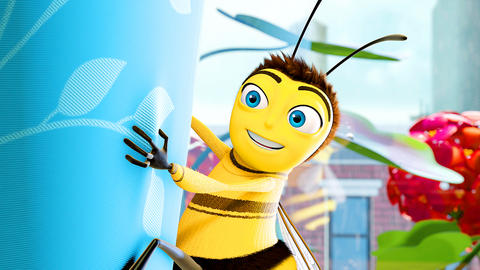Bees rarely fly in a straight line. They hover and zigzag, with a purpose known only to the collective brain of the hive. The most genuinely apian aspect of Bee Movie, DreamWorks' new animated movie about, well, bees, is that it spends a lot of its short running time buzzing happily around, sniffing out fresh jokes wherever they may bloom. There is a plot - the usual big, elaborate story with the usual important messages about saving the planet, living together in interspecies harmony and believing in yourself - but it's a little beside the point. The real fun is the insect shtick.
The DreamWorks Animation formula, exemplified in the mighty Shrek franchise (and imitated by would-be rivals at Sony and Fox), is to charm the children with cute creatures and slapstick action while jabbing at the grown-ups with soft, pseudosophisticated pop-cultural satire. Bee Movie, directed by Simon Smith and Steve Hickner and animated by several hundred industrious drones, pushes this strategy almost to the point of dispensing with the kid stuff altogether.
There are a few splendid cartoon set pieces - including a funny, thrilling bee's-eye tour of New York, from Central Park flora to the surface of a tennis ball to the inside of a speeding car - that show off the latest computer animation techniques. But most of the film's creative energy is verbal rather than visual, and semimature rather than strictly juvenile.

PHOTO: COURTESY OF UIP
Which is hardly surprising. As everyone knows by now, the leading man (and one of the screenwriters and producers) is Jerry Seinfeld, whose sitcom, almost a decade off the network air, lives on in syndication and in the endless recycling of memorable one-liners by a certain type of pathetic Gen-Xer. (Not me, though. I'm the complete opposite of every film critic you've ever met. I'm the master of my domain.)
Seinfeld provides the voice and attitude for Barry B. Benson, a young bee who has reached the stage in his accelerated bug lifestyle when he must choose a career. The hive where he lives is a highly regimented place, where the bees, conditioned by 27 million years of evolution, work without a break in the same job for their whole lives. Visually, this world resembles a sweet, sunny, corporate version of Fritz Lang's Metropolis.
Barry's nerdy pal, Adam (Matthew Broderick), accepts his drone future as part of the natural order of things, but Barry is a maverick, an individualist yearning to break out of the conformist world of the social insects.

PHOTO: COURTESY OF UIP
He may also remind some viewers of Benjamin Braddock, the alliteratively named hero of The Graduate, a film that Bee Movie cites in a few amusing scenes. Not that Barry has an affair with a middle-aged mama bee (all bees are children of the queen, a biological fact the film notes only in passing). Instead he flies even farther from the nest, so to speak, falling in love with an actual human being, a Manhattan florist named Vanessa who speaks in the irresistibly sweet voice of Rene Zellweger.
When you stop to think about it, the prospect of romance between a bee and a person raises some potentially awkward, not to say physiologically outlandish, questions. But of course you're not supposed to think about it. The moral of the story - one of them, anyway - is that we and the bees are interdependent and that we should respect their hard work.
This lesson is satirically driven home in a courtroom plot that erupts just as the love story starts to get sticky. When Barry discovers that honey is sold in supermarkets, and that it is harvested from captive bees held in smoky, shoddy fake hives, he sues the human race, going after some of its notorious bee abusers. These include Ray Liotta, who sells his own brand of honey, and Sting, whose name is obviously offensive to bees. (Both celebrities make cameo voice appearances, as does Larry King, playing a character called Bee Larry King. It's funnier than it sounds. Or maybe it's exactly as funny as it sounds.)
Even when playing an animated bee, Seinfeld does not demonstrate great emotional range. His comfort zone as a performer ranges from peeved to perplexed to moderately psyched, with occasional bursts of obvious exaggeration to indicate that he is at least aware that more intense states of feeling exist. But his detachment works in the movie's favor by defusing its sentimental impulses.
Perhaps because of its star's background in stand-up comedy, Bee Movie makes overt a conceit that is usually left implicit in animal-kingdom cartoons, namely that species is the cartoon version of ethnicity. Barry and his tribe are not just bees. They identify as "Beeish" - I'm sure "Benson" was something else back in the old country - and worry about their children dating wasps. On his travels Barry meets a mosquito who speaks in the voice of Chris Rock and who refers to his despised and misunderstood brethren as "bloods."
These riffs on identity politics give Bee Movie an extra fillip of comic vitality in an otherwise soft and fuzzy entertainment.

April 28 to May 4 During the Japanese colonial era, a city’s “first” high school typically served Japanese students, while Taiwanese attended the “second” high school. Only in Taichung was this reversed. That’s because when Taichung First High School opened its doors on May 1, 1915 to serve Taiwanese students who were previously barred from secondary education, it was the only high school in town. Former principal Hideo Azukisawa threatened to quit when the government in 1922 attempted to transfer the “first” designation to a new local high school for Japanese students, leading to this unusual situation. Prior to the Taichung First

The Ministry of Education last month proposed a nationwide ban on mobile devices in schools, aiming to curb concerns over student phone addiction. Under the revised regulation, which will take effect in August, teachers and schools will be required to collect mobile devices — including phones, laptops and wearables devices — for safekeeping during school hours, unless they are being used for educational purposes. For Chang Fong-ching (張鳳琴), the ban will have a positive impact. “It’s a good move,” says the professor in the department of

On April 17, Chinese Nationalist Party (KMT) Chairman Eric Chu (朱立倫) launched a bold campaign to revive and revitalize the KMT base by calling for an impromptu rally at the Taipei prosecutor’s offices to protest recent arrests of KMT recall campaigners over allegations of forgery and fraud involving signatures of dead voters. The protest had no time to apply for permits and was illegal, but that played into the sense of opposition grievance at alleged weaponization of the judiciary by the Democratic Progressive Party (DPP) to “annihilate” the opposition parties. Blamed for faltering recall campaigns and faced with a KMT chair

Article 2 of the Additional Articles of the Constitution of the Republic of China (中華民國憲法增修條文) stipulates that upon a vote of no confidence in the premier, the president can dissolve the legislature within 10 days. If the legislature is dissolved, a new legislative election must be held within 60 days, and the legislators’ terms will then be reckoned from that election. Two weeks ago Taipei Mayor Chiang Wan-an (蔣萬安) of the Chinese Nationalist Party (KMT) proposed that the legislature hold a vote of no confidence in the premier and dare the president to dissolve the legislature. The legislature is currently controlled